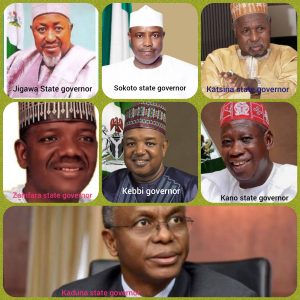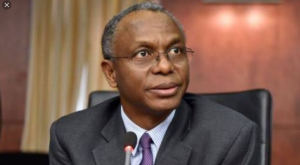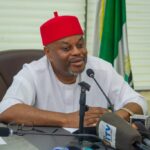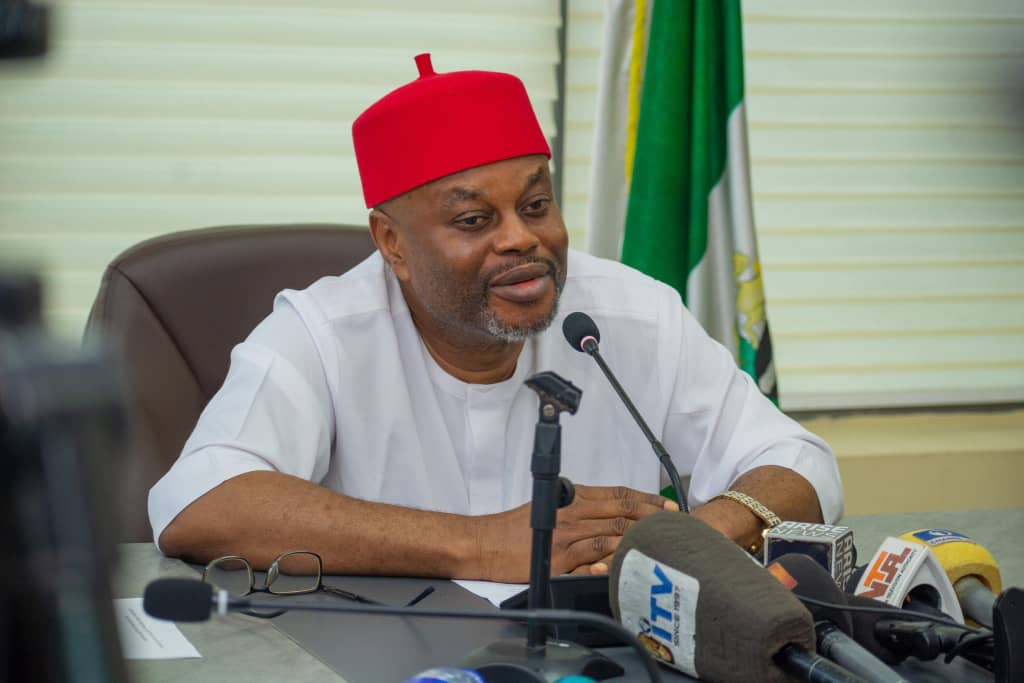Jubal Kanayo writes
The administrators in Northwestern Nigerian states of Kano, Katsina, Zamfara, Kebbi, Sokoto, Kaduna and Jigawa, join the LEADERSHIP Scorecard queue to have their works weighed, to see how they have fared in office,

Divisive Nasir el-Rufais achievements are overshadowed by storms.
 From his time as the Minister of the Federal Capital Territory (FCT), Mallam Nasir el-Rufai has been so maligned that it is difficult to see how much good he really does as an administrator. It is no different now that he is the governor of one of Nigerias upwardly mobile commercial hubs; no thanks to the violent raids by bandits in the nether parts of the state, the unsolved killing by masked gunmen in southern Kaduna, his fights with journalists, civil servants, the Nigeria Bar Association and health workers in the state; his stance on the killings by herdsmen and the many wars his son fights on Twitter in his stead.
From his time as the Minister of the Federal Capital Territory (FCT), Mallam Nasir el-Rufai has been so maligned that it is difficult to see how much good he really does as an administrator. It is no different now that he is the governor of one of Nigerias upwardly mobile commercial hubs; no thanks to the violent raids by bandits in the nether parts of the state, the unsolved killing by masked gunmen in southern Kaduna, his fights with journalists, civil servants, the Nigeria Bar Association and health workers in the state; his stance on the killings by herdsmen and the many wars his son fights on Twitter in his stead.
Besides that, el-Rufai has not done badly as an administrator, with his focus on reforms in public service, education, health, provision of infrastructure and creation of jobs among others.
In 2015, for example, budgetary allocation for running Government House was around N3 billion (2015 under PDP) but was reduced to about N600 million in the first budget ever prepared by this administration in 2016.
Kadunas public service was gulping N2.7 billion monthly when El-Rufai took power in May 2015. This was brought down to N2.2 billion after the biometric exercise to verify employees in the state payroll, an exercise that eliminated ghost workers saving the state N500 million monthly.
Well, into his second term, he has done so much about setting systems in place that he is being touted for some sort of presidency, come 2023 a call that has been vehemently and justly (some say) repelled by not a few.
During his first term, he introduced the Public Service Reform and Revitalisation Project, aimed at strengthening the public service by injecting into its ranks younger, well-educated, IT-compliant and competent personnel.
Given that the services of the local governments were bloated and the LGAs could not pay its workers and execute capital projects, the el-Rufai administration implemented a staffing order for LGAs, reducing the staff strength of the 23 local government councils of the state to 6,896, excluding primary school teachers and health workers.
By that order, all the generic local government councils are required to have a total of 281 staff each, with a total of 5943 staff for the 21 local government councils.
The state government also restructured the traditional institutions reverting to pre-2001 status of 77 districts and 1429 village units, down from 390 districts and 5882 village units created in 2001. Governments decision has relieved the 23 Local Government Councils of the heavy burden of paying 4766 staff to make them concentrate on meeting the obligation of providing public goods and services to the people with the resource available to them.
As of today, all the LGAs have become solvents, able to pay salaries monthly and execute projects without encumbrances.
The reforms in the education sector also led to the replacement of thousands of school teachers, rated as unqualified. Speaking at the swearing-in of commissioners, el-Rufai said there would be no major policy change during his second term and he has kept to that.
Infrastructure
The launch of the Urban Renewal Project, aimed at boosting infrastructural development in the state was quickly followed by a ground-breaking and signing of the contract for the construction of a N3.9 billion Galaxy Mall in the metropolis. The Shopping Mall is being constructed through a public private partnership (PPP).
The Urban Renewal Project has 14 components, which includes the construction and rehabilitation of roads, mass transit transportation, housing, improved land use, street lights, parks and recreational centres, markets, neighbourhood centres and waste management.
Shop owners along Wharf Road, Kaduna, have cleared their structures to pave way for the construction of the Galaxy Shopping Mall and the dualisation of the road. The construction of the new N3billion-naira worth, 2000-shop, Kasuwan Magani Market, Kajuru local government area, to replace the one that was burnt during the crisis that engulfed the community in October 2018, has also commenced.
Also, the dualisation of Katuru Road from Isa Kaita to Rabah Road Kaduna and the construction of the 5.7km road from Millennium City, connecting the eastern bypass to the Kaduna-Abuja Expressway are in progress.
Work has also resumed at the Gonin Gora-Hayin Katafawa-Ungwa Bije Road Project.
Recently, the state government signed a memorandum of understanding (MoU) worth €100 million with Denmark-based Arla Foods International, the biggest milk corporation in the world to boost dairy production in the state. Besides the promise of 50,000 jobs when the project becomes operational, the siting of the factory is aimed at boosting livestock production.
Similarly, the state government has signed a MoU with Cultivating New Frontiers in Agriculture (CNFA), a programme under the United States Agency for International Development (USAID), to implement a five-year programme to support environment policy, facilitate business enabling environment and capacity-building of women and youth involved in agriculture on priority crops in the state.
The project is expected to attract $100 and $200 million in investment and credits to the agricultural sector of the state. The initiative is expected to benefit about 6,000 small businesses and farmer groups across the state. In the health sector, the governor is focusing on the completion of the upgrading of the 255 primary healthcare centres in all the wards across the state.
Furthermore, the second phase of the multi-billion Naira Zaria Water Project which was initiated in 2008 by the administration of former governor Namadi Sambo was completed by the governor and commissioned by President Muhammadu Buhari on August 22, 2019. In order to strengthen the public service and its capacity to deliver quality and responsive public service, the state government on August 26, 2019, implemented the N30,000 national minimum wage.
In order to put an end to ethno-religious conflicts in some communities in the state, the governor inaugurated a 10-man judicial commission of inquiry to investigate the incessant crises in Kajuru, Kachia and Chikun local government areas of the state.
The governor has also embarked on massive road projects across the state at the lowest possible cost. Prominent among these road projects is the 5.125-kilometre Kawo Lugard Hall Ring Road expansion project which was inherited from the immediate past administration. The governor not only continued with this project, he also re-negotiated the contract sum from N3.685 billion to N2.50 billion, saving the state government about N1.1 billion. The state government road construction/rehabilitation projects are also seen in virtually all local governments of the state, over 29 contracts have been awarded, covering roads in both urban and rural areas in 18 of the 23 local government areas across the state. Some of the major ongoing projects are Unguwan Doki Road, Unguwan Sarki Road, dualisation of Rigasa Road, Aliyu Makama Road in Barnawa, expansion of Kano Junction to PZ Road in Zaria, construction of the five-kilometre road linking the airport to the Rigasa Train Station, amongst others.
Thanks to the restructuring of the Kaduna State Public Works Agency (KAPWA), Federal roads especially the Zaria-Sokoto Road which used to be death traps have been maintained. Other roads have been maintained. Similarly, in order to tackle the flood challenge witnessed in parts of the state three years ago, due to lack of drainages on the roads, the present administration has taken steps by constructing drainages in most parts of the state. With work still ongoing in some parts, it is hoped that flood would become history in virtually all parts of Kaduna state upon completion. In addition to road construction, the el-Rufai government also plans to light up Kaduna State by making provision for street lights on major roads of the state.
Education
El-Rufai made a huge statement when he embarked on massive renovation of the state-owned public schools across the state and followed talk with action when he enrolled his one of his sons in one of the renovated, revamped government primary schools.
Also, he ordered a revamp of the state-owned furniture company and awarded contracts for the assembling of classroom furniture for the states public schools. He moved on to the man-power challenge in state-owned secondary schools, with particular preference to the field of science by employing over 2500 science teachers.
Tertiary institutions were also not left out in the educational intervention programme of the el-Rufai-led administration, as they have been recipients of massive capital projects. The governor also increased the budgetary allocations to these institutions to boost their effectiveness and place them amongst the leading tertiary institutions in Nigeria. Applicants into the state-owned tertiary institutions also benefitted from the goodwill of the present administration, as sale of application form or scratch card was abolished on the directive of the governor. Students now apply to be admitted into these tertiary institutions free.
Following up with his revamp of the educational sector, el-Rufai changed the leadership of the Kaduna State Scholarship Board, appointing a new management headed by Hassan Rilwanu, who has since excelled in his duties and sensitised the system to become more transparent and considerate of state government funds.
Civil Service
The el-Rufai administration has also succeeded in reducing corruption in the state civil service by carrying out a rigorous verification exercise for the state civil servants which led to the extrication of over 13,000 ghost workers from the states payroll, thus saving the state huge sums of money.
Accountability was further ensured in the states civil service through the adoption of the Treasury Single Account (TSA) system. The adoption of the TSA system by the administration has tremendously reduced corruption and diversion of governments funds which was prominent in past administrations.
Internally Generated Revenue (IGR)
The El-Rufai led administration has also recorded tremendous increase in the states internally generated revenue. Figures released by the Kaduna State Internal Revenue Service (KDRIS) showed that the state generated N44.9 billion, much more than it did in 2015. This was achieved by blocking leakages and ensuring that tax payers pay directly to the bank. The massive projects going on in the state would also motivate tax payers to pay their taxes promptly.
Investments/Agriculture
The el-Rufai-led administration has also made concerted efforts in attracting investments to the state. Notably is the Kaduna/Chinese partnership which gave birth to the signing of a pact with a Chinese firm to build a new 50,000-barrels per day refinery in the state. The project includes laying an associated 400km pipeline from the border with Niger Republic to Kaduna to transfer crude oil to the proposed refinery. In addition to this, a tripartite memorandum with the government of Hebei province and the China Civil Engineering Construction Corporation (CCECC) was signed with the Kaduna State team led by the governor. The recently organized Kaduna investment summit is also yielding results as various firms have signified interest to invest in state.
Following his visit to Singapore in 2015, Governor el-Rufai succeeded in getting rice production and poultry firm Olam to berth in Kaduna and the firm has gained expansion over the last couple of years, employing more natives as the years roll by and its ease of doing business gets better.
The administration also succeeded in getting a group called African Natural Resources (owned by the Gupta Family) to establish the largest steel plant in Africa in the state. In terms of value, it costs less than what it took to establish Ajaokuta.
Since the state produces one of the worlds best ginger species, the state government has since moved to establish a ginger value chain, establishing a standing committee within the Economic Development Council (ECD), charged with the responsibility of reaching out to ginger farmers and asking them what the government can do, to cultivate bigger hectares of land, to improve their yield through improved seedlings, giving them fertilisers and to assure them of market upon harvest, by having a guaranteed minimum price.
One of the pluses for the administration of el-Rufai is the coming of Sunseed Nigeria Limited (a member of Kewalram Chanrai Group). The company offers total farm solutions which includes supply of entire range of agri inputs from hybrid seeds, crop protection chemicals, fertilisers, tractors and farm implements.
Agric vertical operates 2 edible oil mills in Nigeria and enjoys market leadership position in both soya oil and soya meal.
As a forward integration of the soya meal, the company has set up a poultry feed mill in the state.
Technology
Following the possession of Peugeot Automobile Nigeria (PAN) by the Assets Management Company of Nigeria (AMCON), the states bid to buy it did not fall through, as the AMCON sold it to another buyer (who could not pay up) and PAN was liquidated. The state administration sourced funds and dragged business mogul, Aliko Dangote, into its dream to establish the Dangote-Peugeot Automobile Company.
Having taken its businesses registration processes online and functional, the state, in 2019, was ranked first in the nation for Ease of Doing Business by the World Bank.
Health
The health sector was not left out of the El-Rufai developmental strides as renovation work was done on many health centres across the state with most of them equipped with state-of-the-art facilities and skilled manpower. Most of these health centres now take delivery.
Water Supply
Similarly, the El-Rufai led administration has also showed commitment towards providing water to the people of Zaria and its surrounding local governments. The water project was started by the Makarfi-led regime, but successive governments have shown less commitment towards completion of the project. Since the inception of the present administration, progress has been made on the Zaria water project, with laying of standard piped witnessed in virtually all communities in Zaria. The rehabilitated water treatment plant was also put to test late last year, thus signalling that the project would be completed this year as promised by the governor.
Find all Series here
Scorecard of Northwestern Governors (1)
Scorecard of Northwestern Governors (2)
Scorecard of Northwestern Governors (3)
Scorecard of Northwestern Governors (4)
Scorecard of Northwestern Governors (5)









